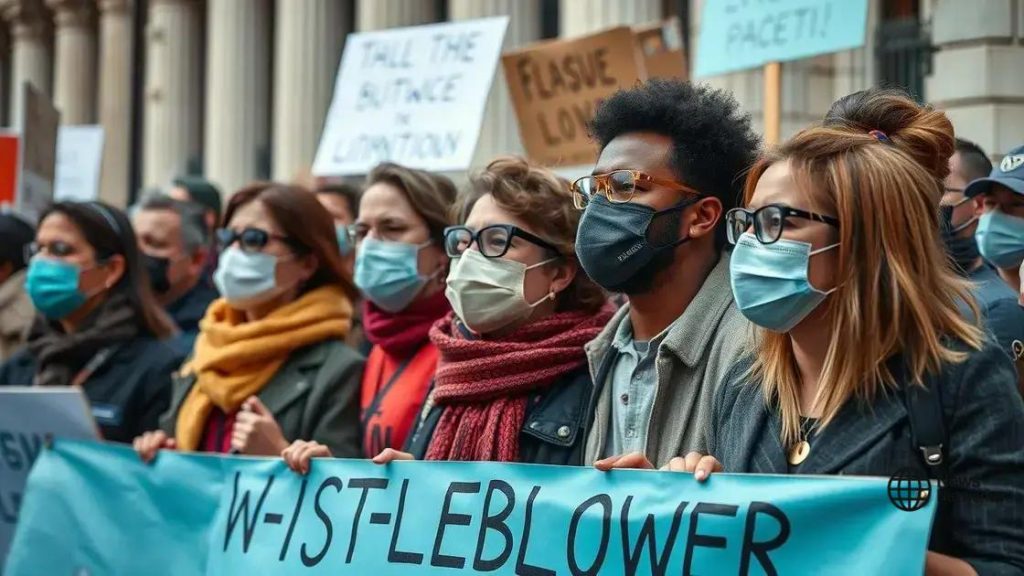Whistleblower protest protections: what you need to know

Whistleblower protest protections ensure that individuals can report misconduct safely, empowering them to disclose unethical practices without fear of retaliation while promoting a culture of transparency and accountability in the workplace.
Whistleblower protest protections play a vital role in ensuring that individuals can safely report misconduct without fear. Have you ever wondered how these protections impact our society and workplaces? Let’s dive into this important topic.
Understanding whistleblower protections
Understanding whistleblower protections is essential for anyone who wants to report wrongdoing in the workplace safely. These protections serve as safeguards for employees who expose illegal or unethical practices, ensuring they won’t face retaliation.
What Are Whistleblower Protections?
Whistleblower protections are laws and policies designed to protect individuals who disclose information about misconduct. These protections encourage employees to report issues without fear of losing their job or suffering other negative consequences.
- They cover various types of misconduct, including fraud and harassment.
- Protections can vary by industry and jurisdiction.
- Employers are often required to have policies in place.
When employees feel safe to speak up, it creates a healthier workplace environment. It also promotes ethical behavior and accountability within organizations. However, knowing the specific rights and protections available is crucial for anyone considering becoming a whistleblower.
Key Aspects of Protections
Several important aspects define whistleblower protections:
- Confidentiality of the whistleblower’s identity.
- Legal protections against retaliation.
- Support from legal frameworks like the Whistleblower Protection Act.
These components help to ensure that individuals can report misconduct without the fear of negative repercussions impacting their careers. It’s vital to understand how these protections work.
In many cases, companies must investigate reports thoroughly while preserving the whistleblower’s confidentiality. This balance between transparency and privacy is crucial in maintaining trust within the organization.
The Importance of Reporting Misconduct
Whistleblower protections foster a culture of integrity and ethical behavior. When employees feel safe to report issues, it not only benefits the individual but also enhances the entire organization. Ethical companies attract and retain talent, drive innovation, and improve their public image.
Legal frameworks supporting whistleblowers
Legal frameworks supporting whistleblowers are crucial in ensuring that individuals can report misconduct safely. These laws provide vital protections and help to create a more transparent and accountable environment.
Overview of Key Laws
Several key laws exist to protect whistleblowers. These laws vary by country but generally aim to provide a safe channel for reporting issues. In the United States, the Whistleblower Protection Act is one of the most significant laws.
- This law protects federal employees who disclose information related to corruption or illegal activities.
- It prohibits retaliation from employers against these employees.
- Many states also have their own whistleblower protection laws.
In addition to national laws, international agreements exist to safeguard whistleblowers. For example, the European Union has adopted directives aimed at enhancing protections for whistleblowers across member states.
The Role of Agencies
Government agencies play a vital role in enforcing whistleblower protections. They provide resources for those who wish to report misconduct. Agencies can investigate claims and ensure that the rights of the whistleblower are upheld.
- Many agencies have hotlines for reporting issues safely.
- They also offer guidance on the legal protections available.
- Some even provide legal assistance for whistleblowers.
Understanding these legal frameworks can empower individuals to speak up about workplace injustices. Knowing their rights helps to alleviate fear of retaliation, encouraging more people to come forward with their experiences. This transparency ultimately contributes to happier and more ethical workplaces.
As awareness of these protections increases, more whistleblowers are stepping forward. This shift is essential for promoting accountability in organizations, ensuring that unethical behaviors do not go unnoticed.
Impact of protections on workplace culture

The impact of protections on workplace culture is significant and far-reaching. When employees know that they can report misconduct without fear, it creates a sense of trust and safety within the organization.
Encouraging Open Communication
With effective protections in place, employees feel more comfortable voicing their concerns. This openness leads to better communication and collaboration among team members. When people can share their thoughts freely, it fosters creativity and innovation.
- Employees are likely to share ideas and solutions.
- Teams become more cohesive and productive.
- A culture of sharing can lead to improved problem-solving.
When workers understand their rights and feel supported by their company, they are more likely to engage in discussions about ethical practices. This proactive approach helps to address issues before they escalate.
Building Trust Between Employees and Management
Whistleblower protections contribute to creating a trustworthy atmosphere. When management takes allegations seriously and investigates claims, it shows employees that their voices matter. This action builds respect and loyalty.
- Trust leads to higher employee retention rates.
- It can lower turnover costs significantly.
- Employees are generally happier and more fulfilled.
Furthermore, strong protections can attract top talent to the organization. Professionals want to work in environments where their integrity is valued and respected. A positive workplace culture tends to enhance employee satisfaction, resulting in increased productivity.
Moreover, companies with robust whistleblower protections comply better with regulations. This compliance reduces the risk of legal issues, benefiting the overall health and reputation of the organization.
Recent protest cases and outcomes
Recent protest cases illustrate the challenges and successes of whistleblower protections in various contexts. These cases shed light on how individuals have bravely stepped forward to report misconduct, often facing significant risks.
Case Study: High-Profile Whistleblowers
In various industries, high-profile whistleblowers have emerged, drawing public attention. Their stories highlight the critical role of protections for those who report wrongdoing. For example, consider the case of a former tech employee who revealed serious ethical breaches in their company. This revelation led to an internal investigation and changes in policy.
- The individual faced backlash but was supported by legal protections.
- The company implemented new training on ethics as a result.
- This case inspired others to speak up about their own concerns.
Such cases demonstrate the importance of whistleblower protections in not only safeguarding individuals but also in prompting organizational change.
Impact of Public Awareness
As public awareness grows regarding whistleblower protections, more people are coming forward. Social media has played a crucial role in amplifying these voices. Many organizations are now more vigilant about ethical practices due to the fear of public backlash.
- Documentaries and news articles often cover whistleblower cases.
- Increased visibility encourages transparency and accountability.
- Companies feel pressure to maintain ethical standards.
Moreover, some protests have resulted in legislative changes that extend protections for whistleblowers. These movements are essential in ensuring that accountability mechanisms are enforced and strengthened, helping individuals feel secure in reporting misconduct.
While not all cases lead to positive outcomes, the overall trend indicates that the support for whistleblowers is growing. As more individuals stand up against unethical behaviors, the workplace landscape is likely to change, benefiting future generations.
Steps to take if facing retaliation
If you are facing retaliation after reporting misconduct, it’s crucial to understand the steps you can take to protect yourself. Knowing your rights is the first step toward ensuring your safety and well-being in the workplace.
Document Everything
The first action to take is to document every incident of retaliation. This includes keeping detailed records of events, conversations, and any changes in your work environment. Documentation can be vital if you need to take further action.
- Write down dates, times, and locations of incidents.
- Note down witnesses who can support your claims.
- Keep copies of relevant communications such as emails or messages.
By having a clear account of your experience, you create a stronger case for your situation.
Review Company Policies
It’s essential to review your company’s policies on whistleblower protections and retaliation. Understanding these policies can inform you about your rights and the steps your employer is required to follow after a report is made. Most companies have listed procedures outlining how to handle complaints.
- Look for any protocols related to reporting retaliation.
- Identify who in your organization is responsible for handling such complaints.
- Check if there are specific time frames for responding to reports.
If your company has clear guidelines, follow them to report your situation appropriately.
Seek Legal Advice
If retaliation continues, consider seeking legal advice from a lawyer who specializes in employment law. A legal professional can guide you on the next steps and help you understand your options. They can also help you file a complaint with the government if necessary.
- Find a lawyer with experience in handling whistleblower cases.
- Discuss your situation thoroughly to identify potential legal actions.
- Ask about any state or federal protections available to you.
Having expert guidance can empower you to take action against retaliation effectively.
Report to Relevant Authorities
If your company’s response is inadequate or if retaliation persists, consider reporting the issue to relevant authorities. Depending on your jurisdiction, this may include federal or state labor boards. These organizations often provide additional protections for whistleblowers.
- File a complaint with your state labor agency.
- Contact the U.S. Equal Employment Opportunity Commission (EEOC) if applicable.
- Consider reaching out to whistleblower protection organizations for assistance.
Taking these steps can help ensure that you are protected and that your concerns are addressed appropriately.
In conclusion, understanding the various aspects of whistleblower protections is crucial for creating a safer workplace. These protections not only empower individuals to report misconduct without fear of retaliation, but they also foster a culture of transparency and accountability. By taking informed steps when facing potential retaliation, such as documenting incidents, reviewing company policies, and seeking legal advice, employees can effectively navigate their rights and responsibilities. Ultimately, supporting whistleblowers leads to healthier workplaces and promotes ethical practices across industries.
FAQ – Frequently Asked Questions about Whistleblower Protections
What should I do if I experience retaliation after reporting misconduct?
Document every incident of retaliation, including dates and witnesses, and review your company’s protection policies.
Are there laws that protect whistleblowers?
Yes, there are various laws at both state and federal levels designed to protect whistleblowers from retaliation.
How can I seek legal advice if I’m retaliated against?
Consult with a lawyer who specializes in employment law and has experience with whistleblower cases to understand your rights.
Where can I report retaliation if my employer does not take action?
You can report retaliation to relevant authorities such as labor boards or federal agencies like the EEOC.





